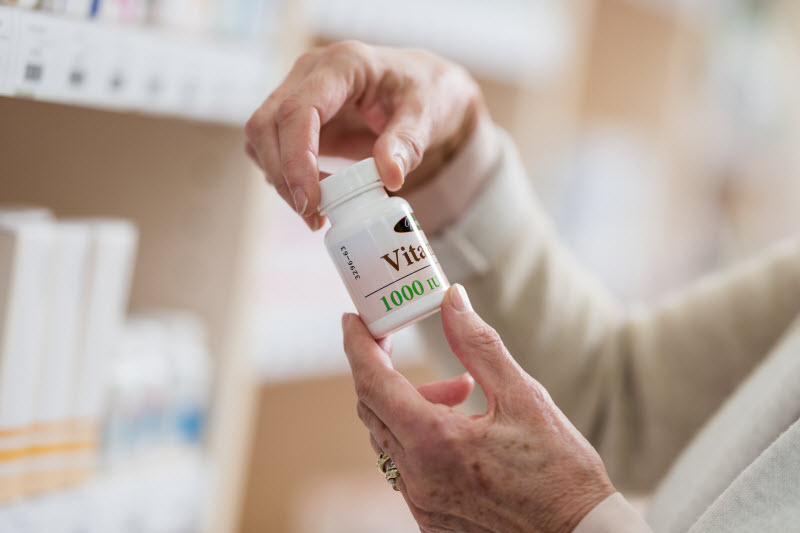Vitamins and supplements can be part of a healthy lifestyle. However, the bargain variety of these products may not boost your health in the way that they claim to do. Here are three reasons to avoid cheap, potentially low-quality vitamins and supplements.
![3 Reasons to Avoid ‘Cheap’ Vitamins & Supplements Woman Holding Bottle of Cheap Vitamins While Browsing Products at Store | Vitacost.com/blog]() 1. ‘Bargain’ vitamins and supplements may not be rigorously tested
1. ‘Bargain’ vitamins and supplements may not be rigorously tested
When you’re shopping for vitamins and supplements, it’s wise to pay attention to the labels.
Reliable brands of vitamins and supplements are tested by ConsumerLab.com, NSF International, U.S. Pharmacopeia (USP) or Underwriters Laboratories (UL). These independent organizations check the content, strength and contaminant levels of vitamins and supplements. A product that passes an organization’s tests earns that group’s “seal of approval,” which then can be displayed on the product’s label.
The federal Office of Dietary Supplements notes that these seals of approval do not mean a product is safe or effective. Rather, a seal of approval assures buyers that the product contains the ingredients listed on the label and that it does not contain harmful levels of contaminants.
Cheap vitamins and supplements may not be subject to those testing standards, though. Therefore, the quality of a product that’s not blessed by a seal of approval could be in doubt.
2. ‘Cheap’ vitamins and supplements may not adhere to U.S. manufacturing standards
The U.S. Food and Drug Administration (FDA) regulates the quality, safety and labeling of vitamins and supplements sold in the U.S. But they “aren’t put through the same strict safety and effectiveness requirements that drugs are,” according to the American Cancer Society.
The Memorial Sloan Kettering Cancer Center warns, however, that vitamins and supplements imported from other countries — products that may fall into the “bargain” category — might be less safe than those made in the U.S. because foreign regulations may be “unclear or relatively lax.” To steer clear of vitamins and supplements that may be tainted, the American Cancer Society cautions against buying products marketed mainly in a foreign language.
All manufacturers and distributors of vitamins and supplements are supposed to ensure the safety of their products before they’re sold in the U.S. The FDA does not review the safety and effectiveness of vitamins and supplements prior to them going on the market.
3. ‘Cheap’ vitamins and supplements may be unhealthy
So, you think you’re scoring a great deal on an order of vitamins or supplements. But have you given thought to why these products are dirt cheap? Unfortunately, these products may be:
- Fake vitamins and supplements could harm, rather than benefit, your health. In 2019, Amazed warned customers that they might have purchased counterfeit supplements masquerading as supplements from a major brand. Fortunately, counterfeiting of vitamins and supplements is not widespread. And fake products that do end up on the market usually are easy to spot; for instance, the labels may be chock-full of misspellings.
- In some cases, fraudsters repackage expired products to make them appear as though they’re new. However, these repackaged products may be useless because they’ve lost their potency.
- Vitamins or supplements may have been swiped from a manufacturer or distributor and then wind up on the black market, triggering doubts about the products’ authenticity. In some cases, crime rings steal large quantities of vitamins and supplements with the intent of selling them illegally.
To prevent being stuck with counterfeit, expired or stolen vitamins and supplements, buy only from trusted companies or directly from manufacturers and distributors.
If you’re uncertain about the reliability of a vitamin or supplement, the South Dakota Department of Health recommends:
- Searching for information about vitamins and supplements on reputable websites, such as those operated by the FDA, National Institutes of Health and U.S. Department of Agriculture (USDA).
- Watching out for false statements like “works better than [a prescription drug],” “totally safe” or has “no side effects.”
- Asking your health care provider for help in figuring out whether vitamin and supplement information is reliable or questionable.

